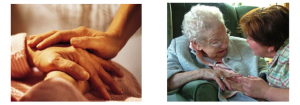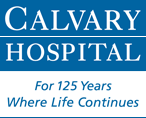November is National Family Caregivers Month
An ideal time to recognize and honor family caregivers
November is significant for two reasons: it is National Hospice & Palliative Care Month as well as National Family Caregivers Month (NFCM).
At Calvary Hospital, we have a special affinity with these topics. As life expectancy continues to increase, more people are finding themselves serving as unpaid informal caregivers to their loved ones and friends. Informal caregivers can be defined as individuals (spouse, partner, family member, friend or neighbor) involved in helping others with daily living and/or medical tasks.
This year’s theme for NFCM is “Caregiving Around the Clock.” Providing direct care for a loved one with a life-limiting or terminal illness is an incredibly challenging job. This year, Calvary Hospital is doing all we can to help spread awareness about National Family Caregivers Month and take a look at all of the vital services provided by these important caregivers.

The National Picture
Here are some sobering statistics on caregiving in the U.S.:
- About 34.2 million Americans have provided unpaid care to an adult age 50 and older in the past 12 months. (National Alliance for Caregiving and AARP; 2015. Caregiving in the U.S.)
- Family caregivers spend an average of 24.4 hours per week providing care. Nearly 1 in 4 caregivers spend 41 hours or more a week providing care. (National Alliance for Caregiving and AARP; 2015. Caregiving in the U.S.)
- The value of services that unpaid caregivers provided in 2013 was estimated to be $470 billion. (AARP Public Policy Institute 2015. Valuing the Invaluable: 2015 Update)
- This exceeded the value of paid home care and total Medicaid spending in 2013.
- This number nearly matched Walmart’s total sales for 2013 ($477 billion).
The Reality of Being a Caregiver
What does it mean to provide care around the clock? Family caregivers are always on duty, from first thing in the morning to the middle of the night. The vast majority of caregivers provide care for one recipient. But some provide care simultaneously for more than one adult.
Caregivers help with daily living tasks such as making and serving meals, assisting with actual feeding, bathing, dressing and personal care. They may also give daily medications, make doctor’s appointments and shop for groceries and other items.
The average duration of a caregiver’s role is 4 years. 85% of caregivers cared for a relative, usually one of their parents. (National Alliance for Caregiving and AARP; 2015. Caregiving in the U.S.)
It’s not uncommon for people’s careers to be affected as they take time off in order to deal with the challenges of being a caregiver.
Not only do caregivers provide companionship, they provide vital support that makes it possible for their loved one to maintain a high quality of life. For family caregivers, their responsibilities don’t end when 5:00 rolls around, and there’s no opportunity to “clock out.”
While men are increasingly taking on the caregiver role, more than 75% of all caregivers are female. (Institute on Aging 2016. How IOA Views Aging in America.) Regardless of employment status, unpaid caregivers report that positive activities in their own daily lives are reduced by 27.2% as a result of their caregiving responsibilities.
[J. Coughlin, (2010). Estimating the Impact on Caregiving and Employment on Well-Being: Outcomes and Insights in Health Management.]“Caring Around the Clock,” acknowledges the fact that “Caregiving can be a 24-hours-a-day, seven-day-a-week job,” states the Caregiver Action Network, which spearheads National Family Caregivers Month.
Self-Care for Caregivers
It’s not surprising that caregivers often neglect their own needs in order to care for their loved ones. This can often result in caregiver burnout, along with numerous physical and other negative consequences.

“Caregivers often take on this role out of love and respect for the patient,” said Andrew Ostergren, Assistant Director of Family Care, Calvary Hospital. “However, it is essential that all caregivers make time regularly to care for their own needs as well. Doing so will, in fact, allow them to be even better caregivers to their loved ones.”
There are tips for family caregivers to get the support they need.
- Acknowledge that you are overwhelmed and need help. This is often the hardest thing to do.
- Seek out other family members and friends who may provide valuable respite for you. Sometimes, you need someone else to sit with or care for your loved one while you take care of other tasks. Make sure to ask other family members and friends for help when needed. Sometimes people are unaware of how much this can help you.
- Eat meals regularly and get enough sleep. Just because you’re caring for someone else, doesn’t mean that you should neglect your own needs.
- Do meditation, yoga, and other forms of exercise If you enjoy meditation, yoga, taking walks or working out at the gym, continue to do so regularly. You need the break and you deserve it!
- Seek professional help. If you find yourself depressed, agitated or not behaving like “yourself,” you may benefit from speaking to a therapist or other professional. Reach out to family and friends who may be able to connect you with someone who can help you.
Closing Thoughts
Calvary is the only hospital in the nation dedicated to providing hospice and palliative care to adult patients with advanced cancer and life-limiting illnesses. Every day, at our four locations and in the community, we work with hundreds of patients and their families. We respect the enormous responsibility that family caregivers are often taken on, sometimes with serious consequences for their own health and well-being.
Together, let’s recognize the important role that family caregivers serve for millions of their loved ones, and encourage them to get the support they need and deserve in order to continue as caregivers.
Categories
Archives
- June 2025
- May 2025
- April 2025
- March 2025
- February 2025
- October 2024
- August 2024
- July 2024
- May 2024
- April 2024
- March 2024
- February 2024
- December 2023
- November 2023
- October 2023
- August 2023
- July 2023
- June 2023
- May 2023
- April 2023
- March 2023
- January 2023
- December 2022
- October 2022
- August 2022
- July 2022
- June 2022
- April 2022
- March 2022
- February 2022
- January 2022
- October 2021
- September 2021
- August 2021
- July 2021
- June 2021
- May 2021
- April 2021
- March 2021
- February 2021
- December 2020
- November 2020
- October 2020
- September 2020
- August 2020
- July 2020
- May 2020
- April 2020
- March 2020
- February 2020
- January 2020
- December 2019
- November 2019
- October 2019
- September 2019
- August 2019
- July 2019
- May 2019
- April 2019
- March 2019
- February 2019
- January 2019
- December 2018
- November 2018
- October 2018
- September 2018
- August 2018
- July 2018
- June 2018
- May 2018
- April 2018
- December 2017
- November 2017
- October 2017
- September 2017
- August 2017
- July 2017
- June 2017
- May 2017
- April 2017
- April 2012

